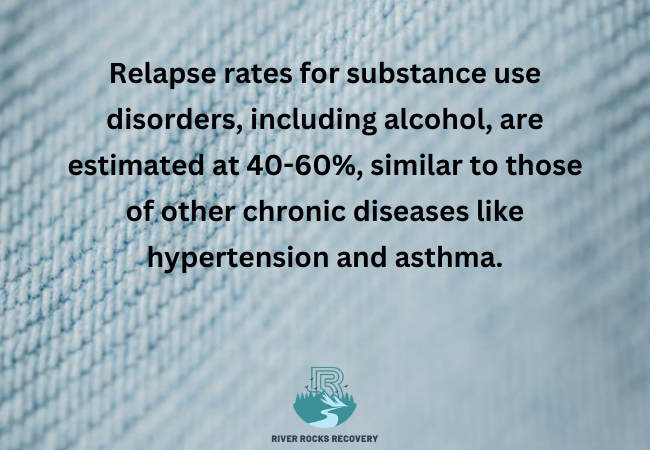Deciding to seek help for alcohol addiction is a major step toward a healthier, sober life. However, choosing the right rehab program can be overwhelming. One of the biggest decisions individuals face is whether to enter inpatient (residential) rehab or an outpatient rehab program. Both options offer structured treatment, therapy, and relapse prevention strategies, but they differ in intensity, duration, and level of support.
At River Rocks Recovery, we provide both inpatient and outpatient alcohol rehab treatment in Ohio, ensuring that each person receives personalized care based on their unique needs.
In This Guide, We Will Cover:
- The key differences between inpatient and outpatient rehab
- Who benefits most from each type of program
- The structure and components of both treatment approaches
- Common myths about inpatient and outpatient rehab
- How to determine the best treatment plan for you
If you or a loved one is struggling with alcohol addiction, this guide will help you make an informed decision about the best alcohol rehab treatment in Ohio.
Understanding Inpatient vs. Outpatient Alcohol Rehab
What is Inpatient Rehab?
Inpatient rehab, also called residential treatment, involves living at a rehab facility for the duration of treatment. It provides round-the-clock medical care, therapy, and structured recovery activities.
Who is Inpatient Rehab Best For?
- Individuals with severe alcohol addiction
- Those with a history of relapse
- People with co-occurring mental health disorders (anxiety, depression, PTSD)
- Individuals who lack a stable, supportive home environment
- Those who need medically supervised detox
What is Outpatient Rehab?
Outpatient rehab allows individuals to live at home while attending treatment sessions at a rehab facility. It provides flexibility for those with work, school, or family responsibilities.
Who is Outpatient Rehab Best For?
- Individuals with mild to moderate alcohol addiction
- Those who have a supportive and stable home environment
- People transitioning from inpatient rehab to independent living
- Individuals who cannot take extended time off work or school
- Those who are highly motivated to maintain sobriety
Inpatient Alcohol Rehab: What to Expect
Structure and Daily Schedule
In an inpatient alcohol rehab program, individuals stay at a treatment center where they receive:
- 24/7 medical and emotional support
- Supervised detox, if needed
- Daily individual and group therapy sessions
- Structured recovery activities (exercise, meditation, life skills workshops)
- Relapse prevention planning and aftercare services
Benefits of Inpatient Rehab
- Provides a safe, structured environment with no access to alcohol
- Offers intensive therapy and medical supervision
- Helps individuals develop healthy routines and coping skills
- Builds strong peer support networks
- Higher success rates due to full-time focus on recovery
Challenges of Inpatient Rehab
- Requires a time commitment of 30-90 days or more
- Individuals may need to take time off work or school
- Can be more expensive than outpatient programs (but insurance often covers treatment)
Outpatient Alcohol Rehab: What to Expect
Structure and Flexibility
Outpatient rehab programs allow individuals to attend therapy sessions while continuing daily responsibilities. At River Rocks Recovery, we offer several outpatient treatment options:
- Partial Hospitalization Program in Ohio – Intensive daytime treatment with medical monitoring.
- Intensive Outpatient Program in Ohio – Therapy sessions multiple times a week while maintaining work or family responsibilities.
- Outpatient Program in Ohio – Weekly therapy for long-term recovery support.
Benefits of Outpatient Rehab
- Allows individuals to continue work, school, and family life
- More affordable than inpatient treatment
- Encourages real-world application of recovery skills
- Provides flexibility while still offering therapy and support
Challenges of Outpatient Rehab
- Less supervision, meaning a higher risk of relapse
- Requires strong self-discipline and commitment
- Not ideal for individuals with severe addiction or withdrawal symptoms
Key Differences Between Inpatient and Outpatient Rehab
| Factor | Inpatient Rehab | Outpatient Rehab |
|---|---|---|
| Living Situation | Stay at the rehab facility 24/7. | Live at home and attend scheduled therapy. |
| Supervision | 24/7 medical and emotional support. | Less supervision outside of therapy. |
| Treatment Length | 30-90+ days, depending on severity. | A few weeks to several months. |
| Intensity | High-intensity treatment. | Moderate-intensity therapy. |
| Best For | Severe addiction, relapse history, co-occurring disorders. | Mild to moderate addiction, strong support system. |
| Cost | Higher due to full-time care. | More affordable, often covered by insurance. |
Common Myths About Inpatient and Outpatient Rehab
Myth #1: Inpatient Rehab is the Only Effective Treatment
Truth: While inpatient rehab provides intensive care, outpatient rehab can be just as effective for individuals with strong motivation and a stable home environment.
Myth #2: Outpatient Rehab is Not as Serious as Inpatient Rehab
Truth: Outpatient rehab follows structured treatment plans that include therapy, group counseling, and relapse prevention strategies.
Myth #3: If I Relapse, It Means Rehab Failed
Truth: Relapse is part of the recovery process for many individuals. The key is to use relapse prevention strategies and continue seeking support.
Myth #4: Outpatient Rehab is Only for People Who Can’t Afford Inpatient Treatment
Truth: Many people choose outpatient rehab because it fits their schedule and allows them to continue daily responsibilities while receiving treatment.

How to Determine the Best Treatment Plan for You
When choosing between inpatient and outpatient alcohol rehab, ask yourself:
- How severe is my alcohol addiction?
- Have I tried quitting before and relapsed?
- Do I have a supportive home environment?
- Can I take time off work or school for inpatient care?
- Do I need medical supervision for withdrawal?
If you are unsure which program is best, a professional addiction assessment can help determine the right level of care.
How River Rocks Recovery Can Help
At River Rocks Recovery, we provide comprehensive inpatient and outpatient alcohol rehab programs in Ohio, ensuring that each individual gets the treatment they need for long-term sobriety.
Our Alcohol Rehab Programs Include:
- Medically Supervised Detox for safe withdrawal management
- Inpatient Alcohol Rehab Treatment in Ohio for structured, full-time recovery
- Partial Hospitalization & Intensive Outpatient Programs for flexible treatment
- Long-Term Relapse Prevention and aftercare services
If you or a loved one is struggling with alcohol addiction, choosing the right rehab program is crucial. Let our team help you find the best path to recovery.
Conclusion
Choosing between inpatient and outpatient rehab is a critical decision that can shape your recovery journey. Both options provide structured treatment, therapy, and relapse prevention strategies, but the best choice depends on your level of addiction, personal responsibilities, and support system.
FAQ About Choosing the Right Alcohol Rehab Program
What is the main difference between inpatient and outpatient alcohol rehab?
- Inpatient rehab requires individuals to live at a treatment facility for 30-90 days, offering 24/7 care, intensive therapy, and a structured environment.
- Outpatient rehab allows individuals to live at home while attending scheduled therapy sessions, offering flexibility for work, school, and family responsibilities.
How do I know if I need inpatient rehab?
Inpatient rehab is best for individuals who:
- Have severe alcohol addiction or long-term dependence.
- Have a history of relapse after previous treatment attempts.
- Need medical detox due to withdrawal risks.
- Have co-occurring mental health disorders (depression, anxiety, PTSD).
- Lack a stable, supportive home environment.
Who is a good candidate for outpatient rehab?
Outpatient rehab is ideal for individuals who:
- Have mild to moderate alcohol addiction.
- Have a strong support system at home.
- Need to continue working, studying, or caring for family while receiving treatment.
- Are transitioning from inpatient rehab to independent living.
What is a Partial Hospitalization Program (PHP)?
A Partial Hospitalization Program (PHP) provides intensive daytime treatment while allowing individuals to return home at night. It offers structured therapy, medical supervision, and relapse prevention planning, making it a step between inpatient and outpatient care.




























